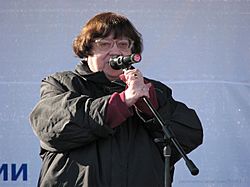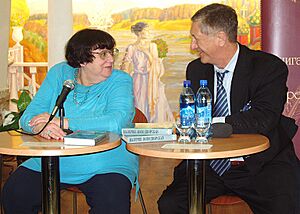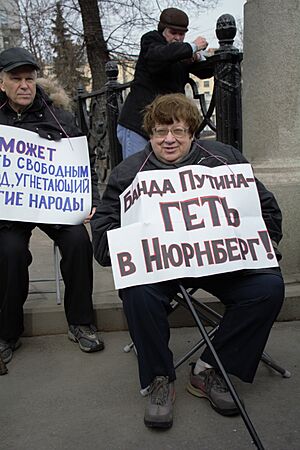Valeriya Novodvorskaya facts for kids
Quick facts for kids
Valeriya Novodvorskaya
|
|
|---|---|

Valeriya Novodvorskaya on a rally in Bolotnaya Square, Moscow, 2010
|
|
| 1st Chairman of the Democratic Union | |
| In office 8 May 1988 – 12 July 2014 |
|
| Preceded by | Position created |
| Personal details | |
| Born |
Valeriya Ilyinichna Novodvorskaya
17 May 1950 Baranavichy, Byelorussian SSR, Soviet Union |
| Died | 12 July 2014 (aged 64) Moscow, Russia |
| Cause of death | Toxic shock syndrome |
| Nationality | Russian |
| Political party | Democratic Union |
| Alma mater | Moscow Region State University |
| Occupation | Journalist |
Valeriya Ilyinichna Novodvorskaya (Russian: Вале́рия Ильи́нична Новодво́рская; 17 May 1950 – 12 July 2014) was a brave Russian writer, journalist, and politician. She was known for speaking out against the Soviet government and later the Russian government. Valeriya was a founder and leader of the Democratic Union party. She believed strongly in freedom and human rights.
Contents
Early Life and Activism
Valeriya Novodvorskaya was born in 1950 in Baranavichy, which was then part of the Soviet Union. Her father was an engineer, and her mother was a doctor.
From a young age, Valeriya was part of the Soviet dissident movement. Dissidents were people who disagreed with the government and spoke out against its rules. When she was just 19, in 1969, she was arrested. She had been sharing leaflets that criticized the Soviet Union's actions in Czechoslovakia. These leaflets included her own poems, which showed her strong feelings against the Communist Party:
...
Thank you Party
For all the falsehood and lies,
For all the denunciations and informers,
For the shots in Prague’s square,
For all the lies you’ve yet to tell.
For the paradise of factories and of flats,
All built on crimes in the torture
Chambers of yesterday and today
And for our broken and black world.
Thank you Party
For our bitterness and despair,
For our shameful silence,
Thank you Party.
...
Challenges and Fight for Freedom
After her arrest, Valeriya was sent to a Soviet psychiatric hospital. The government often used these hospitals to silence people who spoke against them. They claimed she had a mental illness. However, in the early 1990s, independent doctors proved that this claim was false. Valeriya wrote about her difficult experiences in her book, Beyond Despair.
She continued her political work after the Soviet Union ended. She ran for office in the 1993 Russian legislative election and the 1995 Russian legislative election with the Democratic Union party. Even though she was never elected to a public office, she kept fighting for her beliefs.
In 2009, Valeriya Novodvorskaya published another book about her life, called Farewell of Slavianka.
Her Strong Beliefs
Valeriya Novodvorskaya was a strong supporter of liberal ideas. She was known for openly criticizing the Russian government. She spoke out against the Chechen Wars and the policies of Vladimir Putin. She also criticized the return of Soviet-style propaganda in Russia.
Many people called her "the eternal dissident" because she never stopped speaking her mind. She was known for her strong opinions about Russia's past and present. She believed in Western ideas and often compared them to Russia's situation.
Personal Life
Valeriya Novodvorskaya lived with her mother and their cat, Stasik. She enjoyed swimming, reading science fiction, going to the theater, and spending time with her cats.
She was a Christian and belonged to the Ukrainian Autocephalous Orthodox Church. She was very critical of the Russian Orthodox Church, believing it was too close to the government.
Death and Legacy
Valeriya Novodvorskaya passed away on 12 July 2014, due to a serious infection.
She received several awards for her work. In 2008, she was given the Knight's Cross of the Order of the Lithuanian Grand Duke Gediminas. She also received the Galina Starovoytova Award for her efforts in defending human rights and helping democracy grow in Russia. She once said at an award ceremony that she was not just against the government, but actively fighting it.
Valeriya Novodvorskaya is remembered as a fearless voice for freedom and human rights in Russia.
Images for kids
See also
 In Spanish: Valeria Novodvórskaya para niños
In Spanish: Valeria Novodvórskaya para niños
 | Janet Taylor Pickett |
 | Synthia Saint James |
 | Howardena Pindell |
 | Faith Ringgold |





